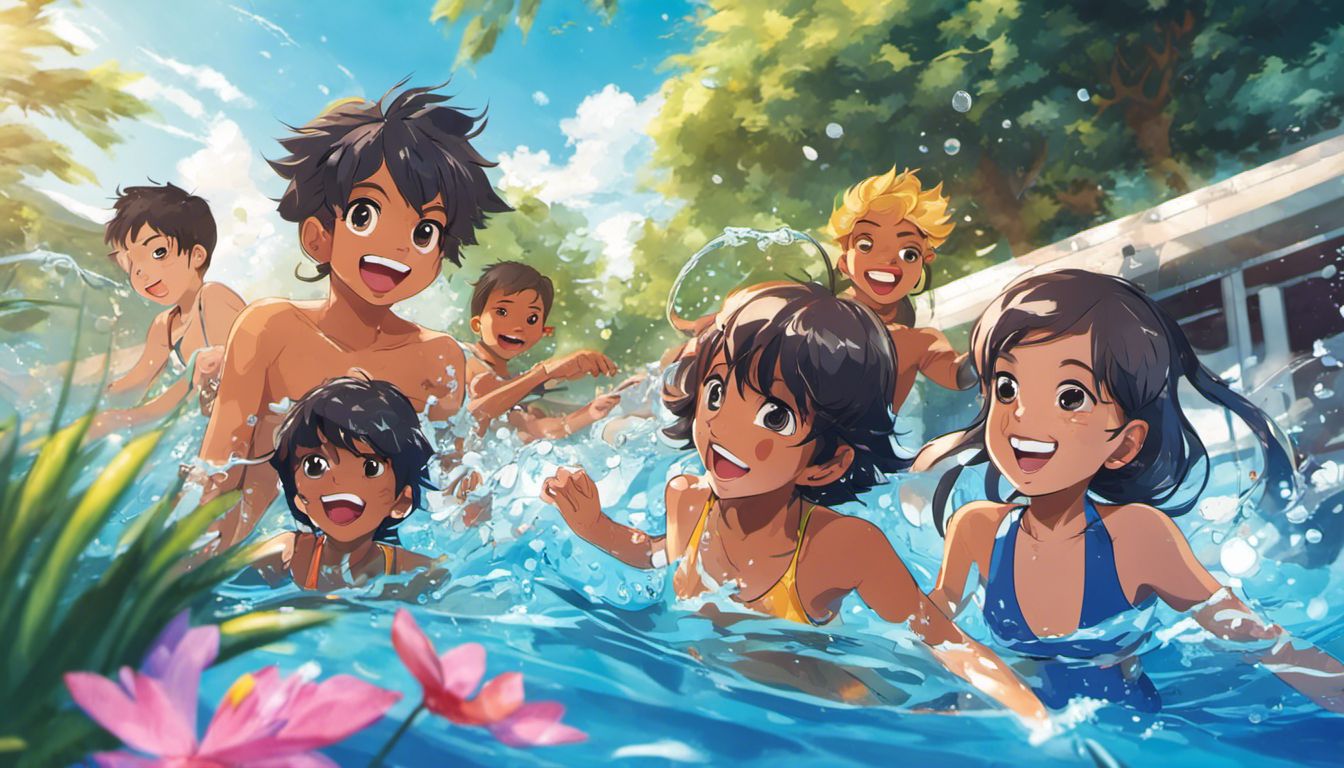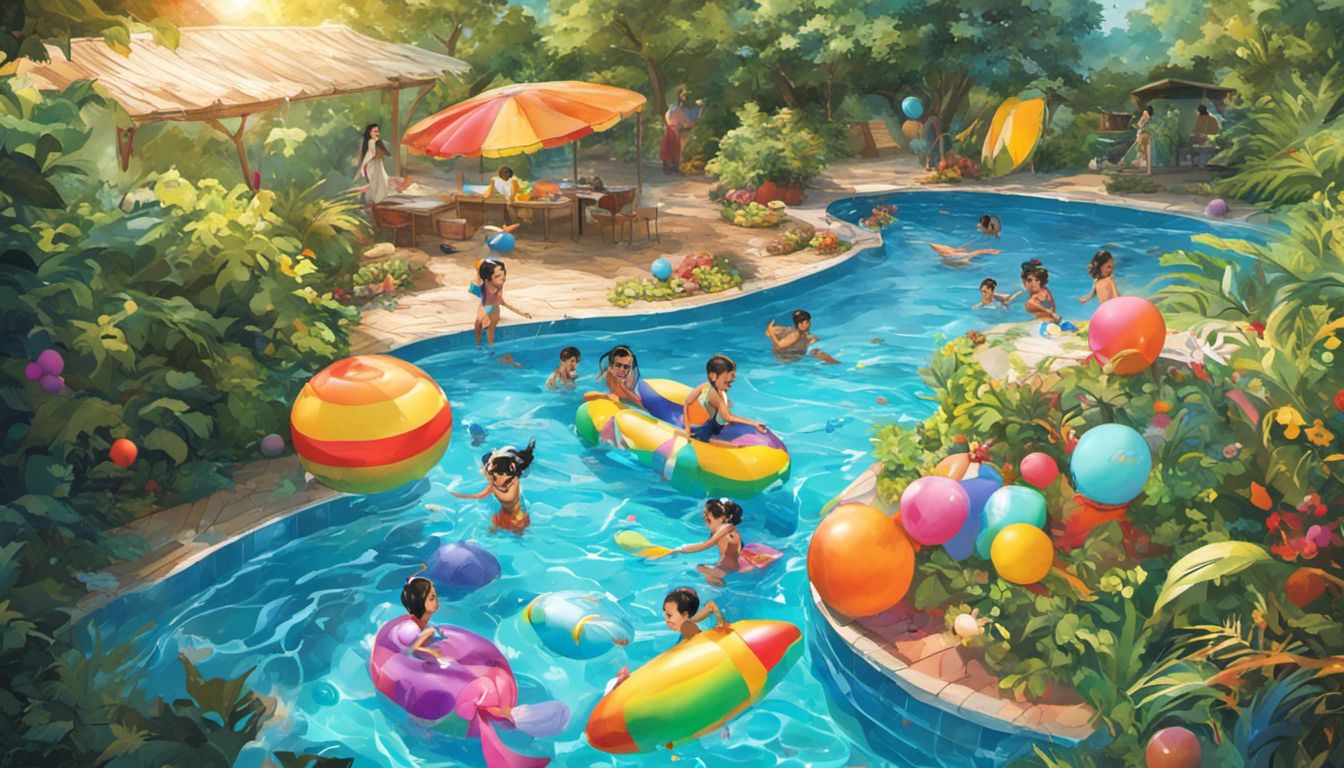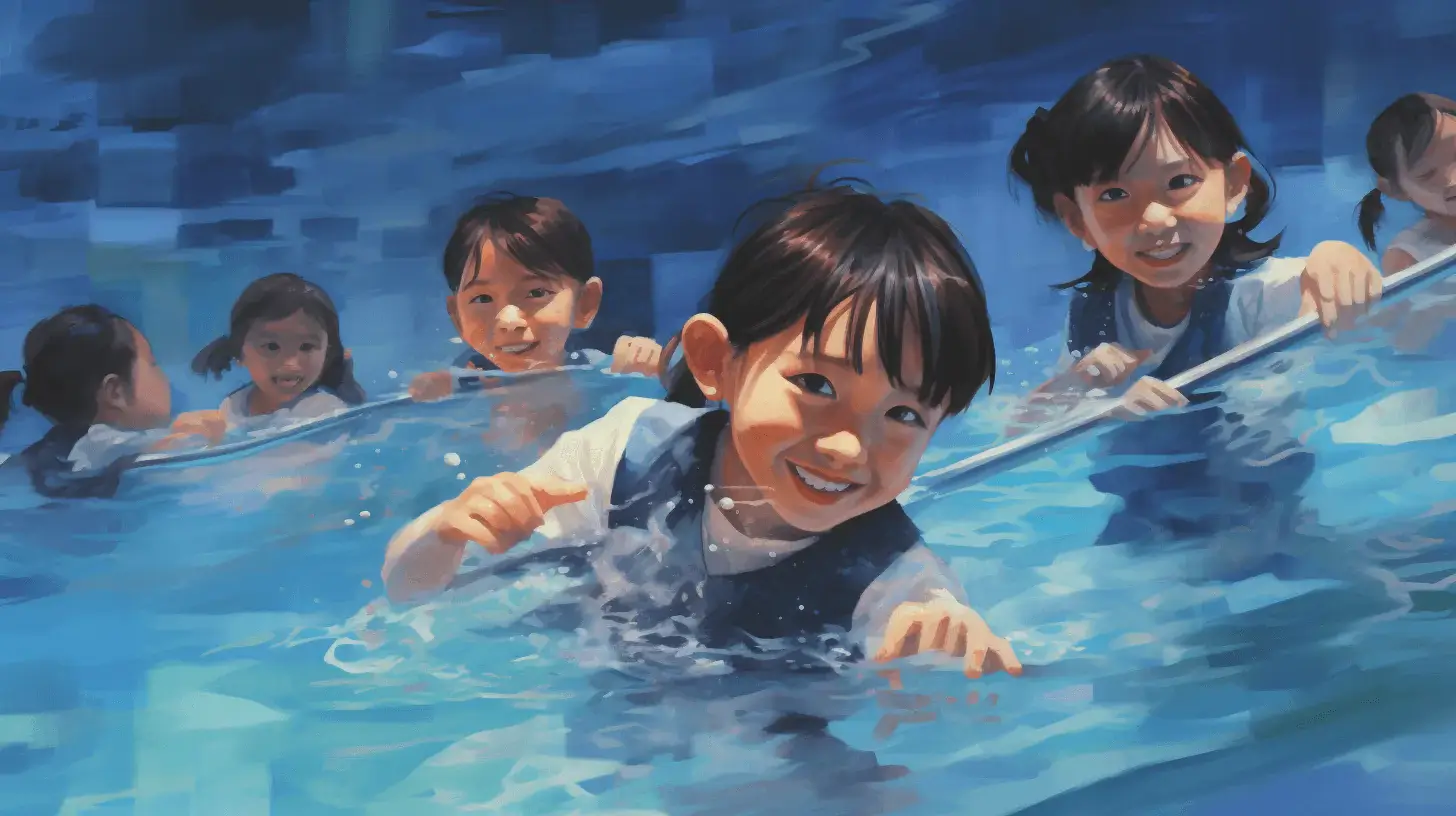When Should Kids Start Swimming Lessons and What You Should Know
Deciding when to start swimming lessons for your kids can be a tricky decision for parents. Did you know, the American Academy of Pediatrics recommends swim lessons starting at age 1 as a step towards preventing drowning? This blog post will guide you through understanding the ideal age to commence these vital sessions and why starting them at an early stage can be significantly advantageous.
Stay with us, it’s time to make a splash!
Key Takeaways
- Kids can start swim lessons at age 1. These classes teach them to be safe in water.
- Swim lessons help kids get fit and feel sure in the water. They also grow a love for swimming.
- Parents need to pick the right class and teacher for their child. It’s important to keep watch during each lesson.
- Safety is key before, during and after each swim lesson.
When Is the Ideal Age for Children to Begin Swimming Lessons?

Kids can start swim lessons at the age of 1. This is what the American Academy of Pediatrics says. This group did studies too. The studies show kids between ages 1 and 4 drown less if they take water survival skills training and swim lessons.
But for babies under 1 year old, these classes aren’t good. That’s also according to the American Academy of Pediatrics. For older kids, ages 4 and up, it’s vital to learn basic water survival skills in their swim class.
Picking a good swimming school helps a lot too! Look for one with experienced teachers who know their stuff really well and are certified through a nationally recognized learn-to-swim program.
Swim lessons help teach your child safe habits around water – very important! But remember that learning to swim doesn’t happen in just one day or even after taking just one set of lessons; it needs time and practice both in the lesson setting but also during family fun times at pools or beaches when you as parents can encourage them by your side!
The Benefits of Starting Swim Lessons at a Young Age

Starting swim lessons at a young age offers numerous benefits such as instilling a sense of water safety, enhancing the child’s confidence in and around water, aiding their physical and mental development, and fostering a lifelong interest in swimming.
Development of water safety skills
Swim lessons help kids grow strong water safety skills. These lessons teach children how to act if they fall in a lake or ocean. Learning to float, call for help, and get out of the water are key parts of these lessons.
The American Academy of Pediatrics notes that starting at age 1 can aid in this learning.
Early swim classes are not geared towards making young swimmers though. Instead, they focus on teaching vital survival tactics around the water. This lays a foundation for drowning prevention and life-saving actions.
However, it’s important to know that even with these skills, constant adult supervision is still crucial near any body of water.
Building water confidence
Swim lessons can help a child become sure in water. This is called building water confidence. It makes kids feel safe around pools, lakes and oceans. They learn how to float and move in water on their own.
It also teaches them not to be scared if they get wet or go under the surface by accident. So, from swim classes, children know what to do when they are in water and stay calm too.
Improving physical and mental development
Swim lessons do more than keep kids safe in water. They help children grow strong in body and mind. Moving in the water works out all parts of the body. This builds muscle strength and keeps hearts healthy.
Learning new moves helps brains to grow too. Once a swim move is learnt, it sticks with them for life, like riding a bike! Plus, swimming is also lots of fun!
Creating a lifelong love for swimming
Swim lessons can help your child fall in love with swimming. This is more than just a fun sport. It’s also great exercise and a vital skill for safety near water. Early swim lessons give kids a chance to feel at ease in the water.
Over time, this comfort can grow into a deep love for swimming that lasts their whole life. Good swim schools teach much more than how to do strokes. They make sure kids respect the water and know how to be safe around it too!
Factors to Consider Before Enrolling Your Child in Swim Lessons
Before signing up your child for swimming lessons, consider their age and readiness, how comfortable they are in the water, the level of parental supervision required during classes, as well as the structure and length of the swim program.
Age and readiness
Every kid is unique. For swimming, the right age for one may not work for another. The American Academy of Pediatrics says swim lessons can start at age 1. Yet, they do not advise swim classes for babies under a year old.
So, it is best to think about your child’s growth and bravery around water before you start swim lessons. Ask your kid’s doctor if they are ready to learn how to swim.
Comfort level in the water
Kids must feel okay in the water before swim lessons start. This will help them learn faster. Not all kids are ready at the same time. Some may take more time to feel good around the water.
Parents can play with their child in a small pool to help them get used to it. Going slow is key so that they do not get scared. In time, this comfort level grows and helps as they go for formal swim lessons later on.
Parental supervision
In swim lessons, parents play a big role. They must watch their kids at all times. This is called “touch supervision”. It means the adult is always close to the child. Even after a child learns to swim, this rule stays.
Parents should also ask if they can see a class before signing up their child because it helps them pick what’s best for their kid. They must teach children always to seek permission before entering water bodies as well.
Program duration and structure
Most swim classes last around 30 minutes to one hour. They aim to keep the lessons fun and engaging for kids. Some programs focus on teaching basic skills like floating, kicking and arm strokes.
Other programs go further by giving kids more advanced training.
The structure of each class can be different based on age groups as well. For example, infant classes may have lots of songs and games while older kid’s sessions could be more focused on skill-building.
Swim schools hold these classes once or twice a week over several weeks or months. It depends on how fast your child learns to swim.
What to Expect During Swim Lessons at Different Ages
Swim lessons differ greatly depending on the age of your child; infants and toddlers are introduced to water gently, preschoolers start learning basic swimming skills, while children aged 4 and up get more advanced instructions.
Wondering what’s in store for your little one? Keep reading to find out!
Infants and toddlers
Swim lessons for infants and toddlers have a lot to offer.
- The American Pediatrics Academy suggests starting at age one. This is a good time to get children used to the water.
- Babies under one year should not take swim classes, according to the same group.
- For all little ones, safety habits are key parts of good lessons.
- Seeing a class before joining it can help you pick the right one for your baby or toddler.
- These lessons do more than teach kids how to move in water. They also show them how to survive if they fall in.
- Classes can lower the risk of drowning for children aged 1 – 4 years old.
- Picking classes that teach kids more than just how to swim is smart.
Preschoolers
Preschoolers start to gain more control over their movements. The swim classes for this age group are fun. They help kids feel at ease in the water. Here’s what you can expect:
- Kids learn basic water skills, like floating and kicking.
- These lessons focus on water safety rules.
- Swim games make learning fun!
- Some classes teach kids how to use life vests.
- Parents often watch these classes.
- A trained teacher leads the class.
- The American Academy of Pediatrics says that kids ages 1 – 4 may benefit from these lessons.
Children ages 4 and up
Children aged four and above can start swimming lessons.
- In these classes, they learn basic water survival skills.
- They also learn safety habits like never swimming alone.
- Every child should ask for permission before going in the water.
- The swim teachers make sure to keep the lessons fun for them.
- They teach children to put their face in the water and blow bubbles.
- Kids learn about floating on their back and tummy too.
- They also begin to learn how to move through the water with their arms and legs.
- The American Academy of Pediatrics backs swim lessons from age one onward as a way to lower drowning risk.
- Taking part in swim lessons at this age can boost kids’ confidence around water. It helps them grow as swimmers too.
- A good tip is for parents to watch a lesson first. Then they see how it works before enrolling their child.
- It’s best if children attend more than one session a week. This helps them make steady progress in learning how to swim.
Tips for a Successful and Safe Swim Lesson Experience
Choosing the right swim class and instructor is a crucial first step to ensure your child enjoys learning. It’s important that you’re present and actively supervise your child during swim sessions, making them feel more comfortable.
Lastly, maintaining safety measures such as having rescue equipment nearby and knowing CPR can help in avoiding accidents before, during or after lessons.
Choosing the right swim class and instructor
Picking the right swim class and instructor is key. Here are some tips:
- Know what you want. Do your kids need basic skills, or are they ready for steps beyond?
- Check out the teacher’s qualifications. Good teachers have a certificate from a well-known swim school program.
- Make sure the class has few kids to one teacher. Kids learn more with less crowd.
- Ask about safety steps in place at the swim school.
- Watch how the teacher talks with kids and parents.
- Ask if parents can watch lessons.
- Don’t rush it! Each child learns at their own pace.
Properly supervising your child during swim time
Taking good care of your child during swim time is key. Here are a few things to keep in mind:
- Keep close: Always stay within arm’s reach of young kids.
- Eyes on the water: Make sure you can see your child at all times.
- Less talk, more watch: It’s not a time for phone chats or reading books.
- Take turns with other adults: If you need a break, let another grown-up take over.
- Learn CPR: This skill could save your child’s life in an emergency.
- Use swimming aids with care: They help but do not replace adult supervision.
- Teach water rules: Show kids how to behave near the water.
- No running: Kids should walk around pools to avoid slips and falls.
- Wear life jackets on boats: This can help prevent drowning in lakes or oceans.
Safety precautions to take before, during, and after lessons
Swim lessons are an exciting adventure for children. But, safety is key, before, during and after each lesson.
- Make sure your child is fit and well before they attend a lesson.
- It’s important to use the toilet and wash hands and feet before getting in the pool.
- Have all swimming gear ready – costumes, goggles, towels and swim aids.
- Your child should always listen to their teacher during class.
- Keep track of where your child is in the water at all times.
- All children must follow pool rules – no running or rough play.
- Children should never dive into shallow waters.
- It’s crucial to dry off properly after a swim to avoid colds.
- If your child feels unwell or dizzy after swim time, tell a lifeguard right away.
- Always pack all swimming gear away neatly for next time.
Conclusion
Choosing the right time for kids to start swim lessons is key. It can differ based on each child’s comfort and growth. But, age one is often a good start. Let’s help our kids love water and learn to swim safely!
Frequently Ask Questions
When is the best age for a child to start swimming lessons?
There is no universally agreed on "best age" to start swimming lessons for kids. However, the American Academy of Pediatrics recommends that children start by age 1. Ultimately, the best age will depend on a child's individual development and readiness for swim lessons.
What should I look for in a swim class for my toddler?
When looking for a swim class for your toddler, it’s crucial to find a program that emphasizes water safety and basic water skills in a fun and positive environment. A qualified swim instructor with experience teaching children to swim should lead the classes.
Are babies and toddlers developmentally ready for swim lessons?
It largely depends on the child, but many babies and toddlers are ready for swim lessons. In fact, swimming lessons for babies can be a great opportunity for parent and child bonding, and it helps children develop a comfort with water at a young age.
How do I know if my child is ready for swim classes?
A child is ready for swim classes when they can follow instructions and have developed enough motor skills for basic swimming techniques. Typically, children ages 1 to 4 are developmentally ready for swim classes.
Does my child need to know how to swim before starting swim lessons?
No, swimming lessons for kids are designed to teach children how to swim and aren’t designed to require pre-existing swimming skills. They are suitable for complete beginners as well as children who already have some familiarity with water.
My child didn’t start swimming lessons as a toddler, is it too late?
No, it's never too late for a child to start swimming lessons. While starting earlier can help children develop water comfort and skills sooner, children can learn to swim efficiently at any age. It's always a good time to start swimming lessons.
What are the benefits of parent and child swim lessons?
Parent and child swim lessons create a supportive environment for children to learn swimming. They can help children to be more comfortable in water, develop basic water skills, and they offer an excellent opportunity for parent and child bonding through shared activity.
Where can I find reputable swimming lessons for my child?
Many organizations offer swimming lessons for kids, including community recreation centers, swim schools, and private swim instructors. It's important to research and find an organization or individual that is reputable, certified, and experienced in teaching children to swim.
How do I help my child get the most out of their swim lessons?
To help your child get the most of their swimming lessons, ensure they're comfortable, support their learning, and practice the skills taught in lessons outside of class. Attend the classes, show enthusiasm about their progress, encourage them, and make sure that they see learning to swim as a fun and beneficial experience.
What are the potential dangers if my child doesn’t learn to swim at a young age?
Not knowing how to swim can pose significant safety risks, especially for children. Swim lessons aim to reduce these risks by teaching children essential water safety skills and how to save themselves if they accidentally fall into the water. Encourage your child to learn swimming as a necessary life skill.









